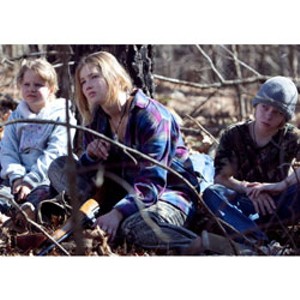Published July 28, 2010 at 8:53 a.m.
There’s an adjective we Vermont arts writers use often, probably more often than our metropolitan counterparts: “hardscrabble.” My Webster’s says it means “yielding or gaining a meager living by great labor.” In practice, and when applied to people, “hardscrabble” is a polite way of saying “dirt poor.” Given that the classic hardscrabblers are the rural, working poor, and that many of us can count our ancestors among them, maybe it’s also a way of saying, “There but for the grace of God (or until we run out of oil) go I.”
Director Debra Granik’s independent drama Winter’s Bone is set in the Ozarks, not the Northeast Kingdom. But it’s exactly the kind of film that makes us reach for the word “hardscrabble” to convey the combination of respect and queasiness its characters’ way of life inspires.
The film is based on a novel by Missouri’s Daniel Woodrell, who coined the term “country noir” for his fiction and sounds like the Ozarks equivalent of our own Castle Freeman Jr. His plot is as bare bones as it is gripping.
Seventeen-year-old Ree Dolly (Jennifer Lawrence) lives on a bleak, rural homestead with her two younger siblings and their mentally ill mother. She has taken on the mom role, cooking for the kids (’taters in Crisco) and quizzing them on their homework. Ree’s dad, who’s off somewhere cooking meth, is irrelevant to her until the sheriff (Garret Dillahunt) comes to announce he’s skipped bail, leaving the family home as his bond.
If Ree doesn’t find her father and drag him back, she’ll watch her family dissolve and lose its only treasure, the property’s hundred-year-old woods. Local folks with financial interest in her dad’s trade stand in her way. And, while Ree is tough for a teen, the men and women she meets on her quest have several decades of hardscrabbling on her.
Winter’s Bone draws inevitable comparisons to Courtney Hunt’s 2008 Frozen River, which was filmed in Plattsburgh. They’re both movies about desperate women made by emerging female directors. They both focus unblinkingly on poor Americans’ daily rituals. And they both received the Grand Jury Prize at the Sundance Film Festival from a panel of judges who’ve probably never had to shoot and skin a squirrel for food, as Ree does in the film.
But Winter’s Bone has the edge, commercially and aesthetically, and not just because its star is young and Hollywood pretty. While heavy-handed plotting pulled Hunt’s film down, Granik’s unfolds like an old country ballad, alternately spine tingling and rousing. Its terse characters don’t explain themselves, but they get life from skilled, natural actors — such as John Hawkes, a veteran supporting player who comes into his own as Ree’s cagey uncle, Teardrop.
As for Ree, well, I think every teen who’s ever watched “The Hills” should get to know her, regardless of the film’s R rating, just as a reminder that being a girl is about more than mumbling and accessorizing. (For the record, the rating is mainly for cuss words.) This girl doesn’t “kick ass” like Uma Thurman in Kill Bill. She just walks into the vipers’ nest and stares the vipers in the eye. Lawrence makes Ree a study in courage, as laconic as John Wayne, with her own kind of grace and bravado. When Ree tells a friend who’s taken a risk for her, “You really are the person I always thought you were, darlin’,” we understand why she gets her way more often than her size and strength warrant.
Some people call movies about the hardscrabble life “poverty tourism.” I see their point. If Ree existed, she might rather watch “The Hills” or Twilight than this movie, and can you blame her? Realism is a taste we acquire after consuming too much of its opposite.
But this movie doesn’t pander to its audience or encourage viewers to condescend to its characters. It delivers a jolt like the raw, angry young voice that speaks to us from a Hank Williams Sr. song.
*
* Running Time: 100 minutes
* Rated: R
More By This Author
Speaking of Movies, movie Review
-

Next Month Brings the Final Curtain for Palace 9 Cinemas
Oct 27, 2023 -

Book Review: 'Save Me a Seat! A Life With Movies,' Rick Winston
Aug 30, 2023 -

Steve MacQueen Named Executive Director of Vermont International Film Festival
May 22, 2023 -

Vermonters Are Going Back to the Movies — Under the Stars
Aug 26, 2020 -

Where to Catch a Movie Near Burlington
Sep 11, 2018 - More »
Comments
Comments are closed.
From 2014-2020, Seven Days allowed readers to comment on all stories posted on our website. While we've appreciated the suggestions and insights, right now Seven Days is prioritizing our core mission — producing high-quality, responsible local journalism — over moderating online debates between readers.
To criticize, correct or praise our reporting, please send us a letter to the editor or send us a tip. We’ll check it out and report the results.
Online comments may return when we have better tech tools for managing them. Thanks for reading.











































